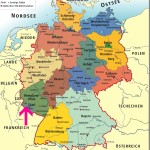 The German Saarland is about to become the first European region with “generated bilingualism” – maybe the ultimate proof that a true language policy is possible in Europe, when targets are clearly stated.
The German Saarland is about to become the first European region with “generated bilingualism” – maybe the ultimate proof that a true language policy is possible in Europe, when targets are clearly stated.
Proposals by the Regional Government of Saarland include bilingual teaching from pre-school age, in order to stress economic ties with France, and requiring new state employees to be able to work in French. A brave and forward-looking choice, which perfectly fits into the targets of a real European integration.
Saarland is not like any other state of the German Federation. It borders on the French Lorraine, and it was a French-occupied territory in 1945, becoming an international territory separated from the rest of Germany from 1946 – Saarland even had a national soccer team and once played against Germany in 1953. France wanted Saarland to be the first supranational European state, even if temporarily under French military counsel. There came the challenges with Germany: in 1945, Saarland was offered independence but the inhabitants voted to be German instead.
This vote has not stopped Saarland to become more and more integrated with the bordering French departments over time, and the border has become a ‘single’ region. The idea of bilingual teaching is the ultimate step made by Saarland towards the creation of a new concept of citizenship. For the first time in United Europe, belonging is to be defined notwithstanding languages: Saarland shows how European language geography can easily be modified – the society itself asks for the change to be made, because of the authentic underlying need. France and Germany, of few words and much work instead, has conferred the cancellation of borders its true consequence: economic and social integration.
Italy – obviously – is light years behind this forward-looking attitude. Friuli-Venezia Giulia is wasting time and money in teaching Friulian or in protecting abstruse dialects (such as the one of Val di Resia) instead of introducing Slovenian – Italian bilingual teaching. This would be a real step forward in overcoming the battles we had on our eastern border (which still carry several cohabitation problems). This would be a real step towards rebalancing the imbalances of an incoherently developed territory, where ports and airports fight instead of helping each other, where railways come from the Hapsburg dominance and cross-border economy is far too little. The same idea can be applied to Piedmont’s western regions and Lombardy’s northern ones, where bilingual teaching (French – Italian and German – Italian, respectively) could boost economy and give a significance to the notorious trans-European networks.
The Italian Northern League should focus on these matters – if they really want to pursue its territory’s needs. Yet, Saarland is quietly creating a new European landscape, while Italy assists to noisy, non-sense discussions about a potential €-exit.
Diego Marani


![Cassoni per l'acqua in amianto. Bandito a livello Ue, è ancora presente sul mercato [foto: imagoeconomica]](https://www.eunews.it/wp-content/uploads/2025/01/Imagoeconomica_2251324-120x86.jpg)


